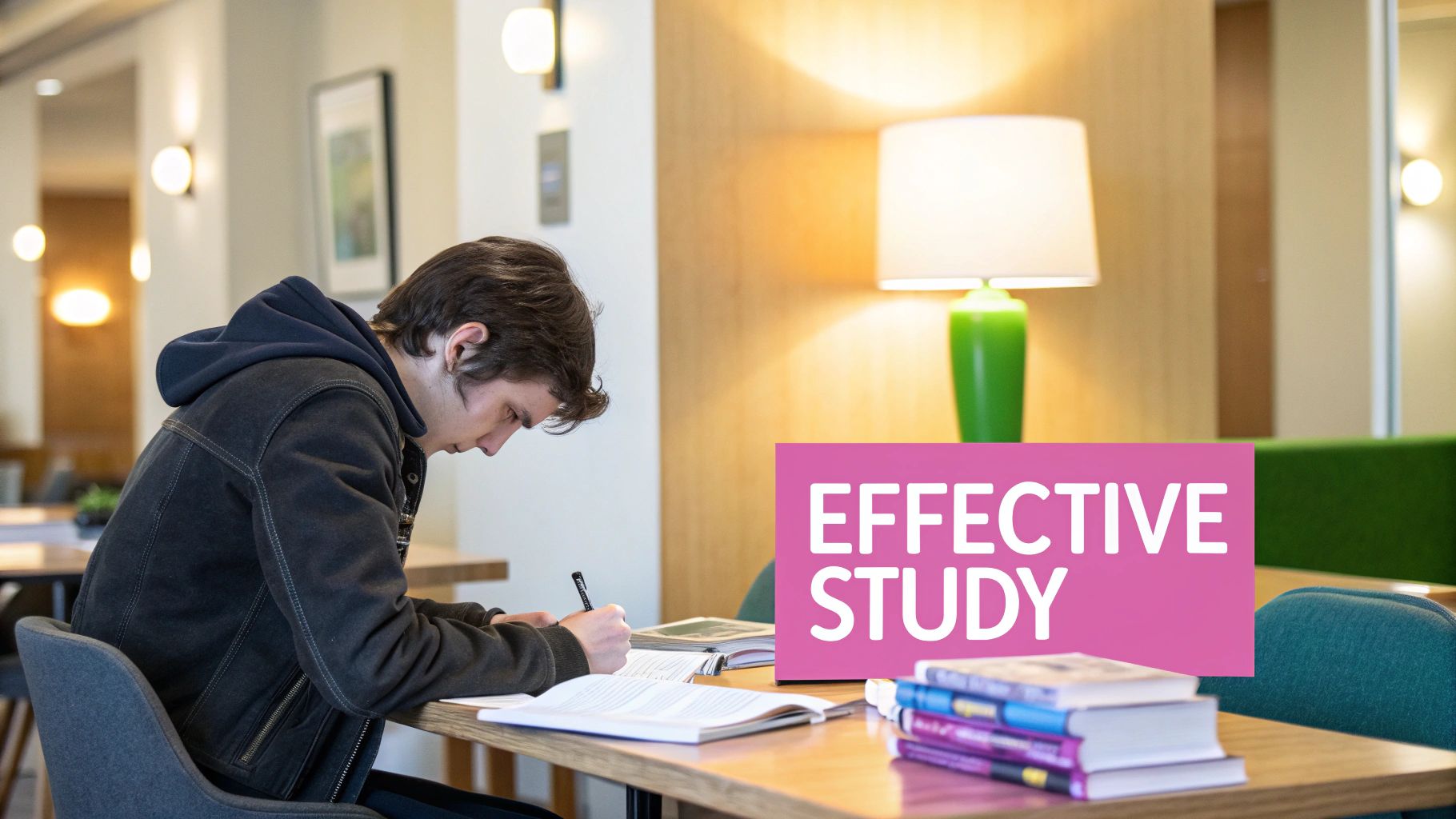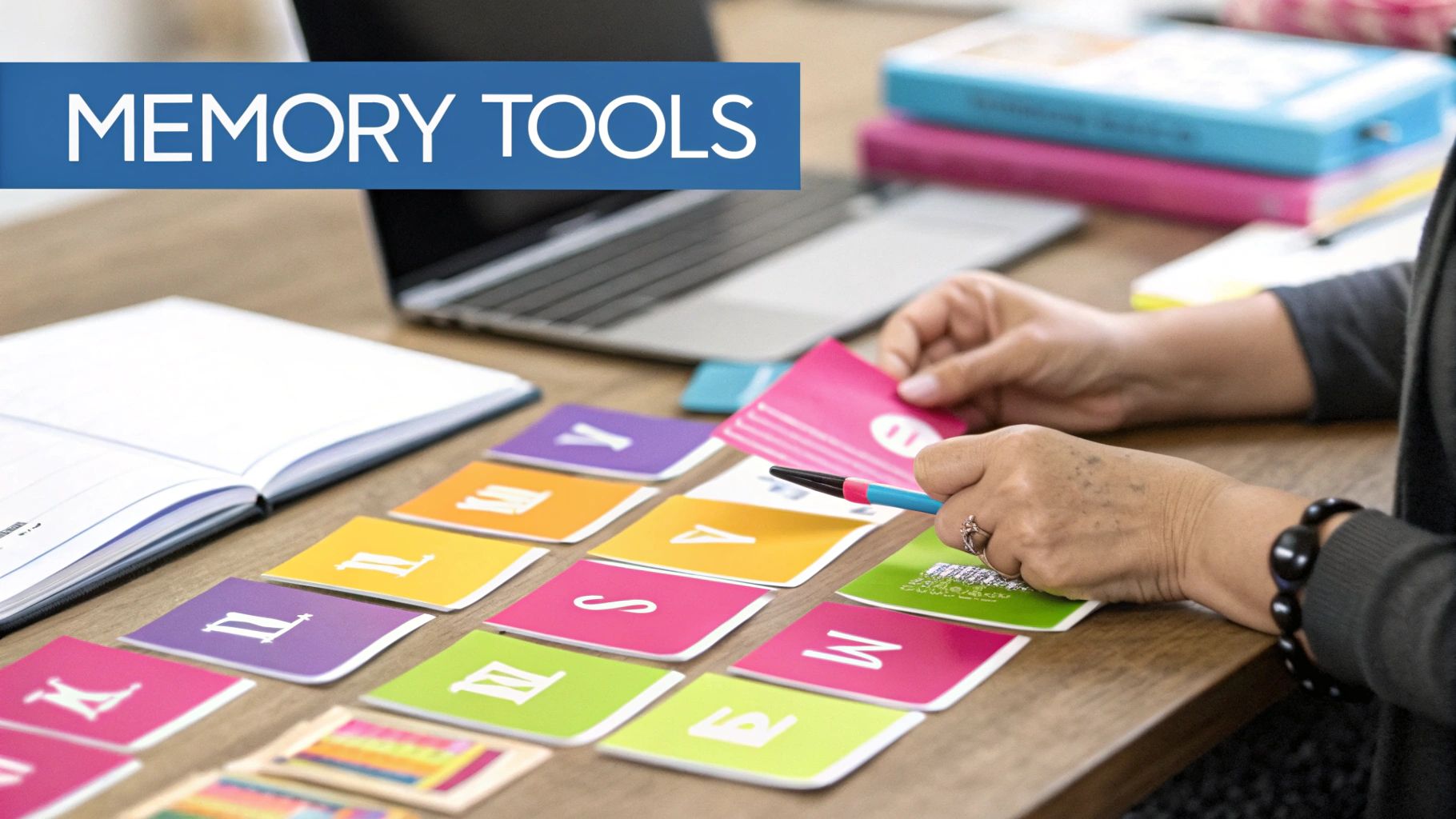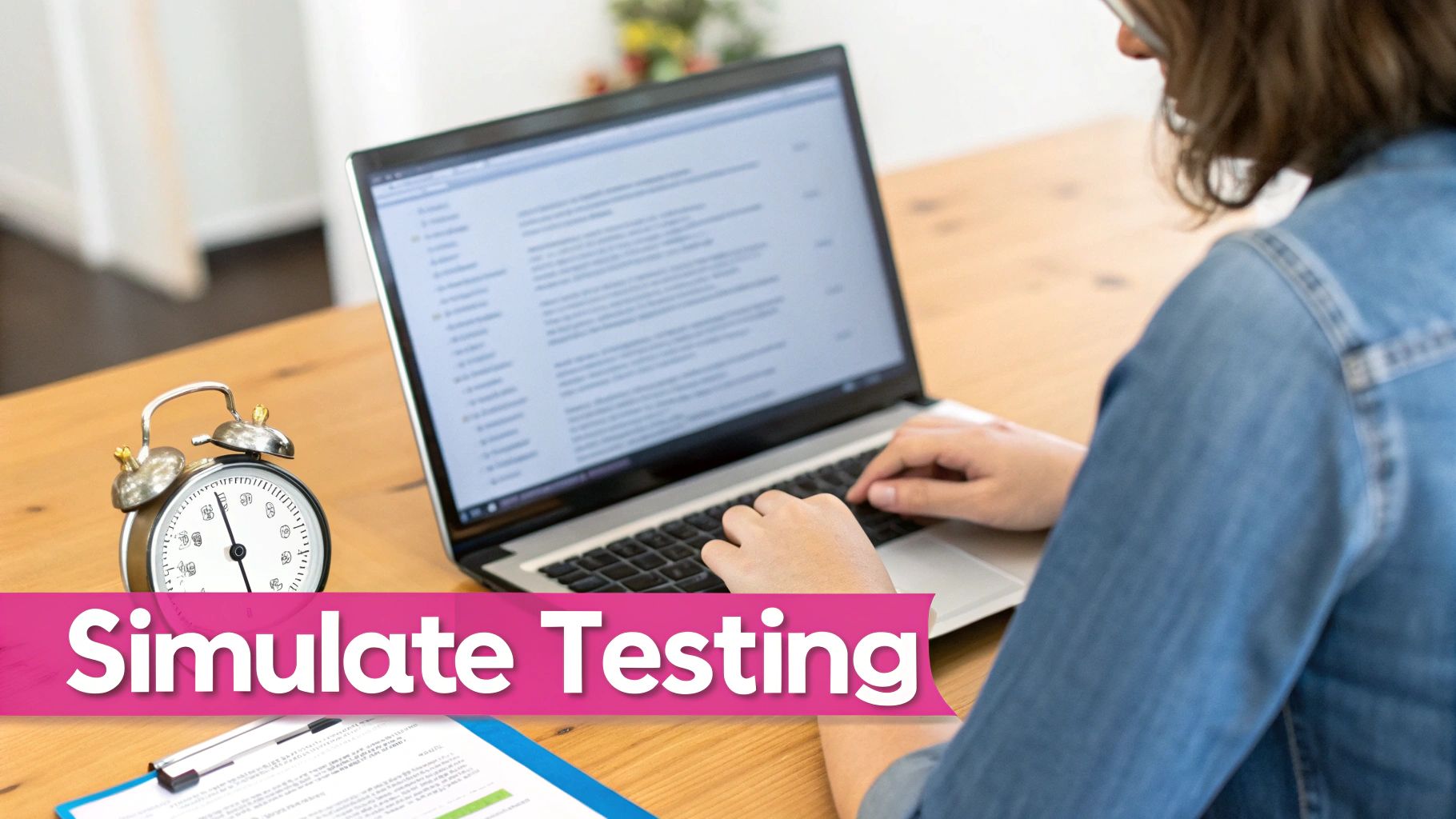
How to Pass a Test: Science-Backed Strategies for Rising to the Top
Breaking Down the Science of Test Success

Success on tests isn't about random chance or last-minute cramming. Research shows that effective learning comes down to using proven strategies based on how our brains actually process and retain information. For example, while many students default to passively rereading their notes, studies have found that actively testing yourself on the material leads to much better long-term retention. This means the methods you use to study matter just as much as the time you put in.
Understanding How High Achievers Approach Exams
Top students tend to share several key habits when preparing for tests. Rather than seeing exams as judgments of their abilities, they treat them as challenges to overcome through smart preparation. These students make it a priority to understand exactly what the test will involve – from question formats to time limits to overall structure. With this knowledge, they can create targeted study plans. A student facing multiple choice questions might practice rapid information recall, while someone preparing for essay questions would focus on building clear arguments and writing skills.
Managing Mental Energy and Peak Performance
Doing well on a test requires more than just cramming knowledge the night before. Students need to carefully manage their mental energy throughout the entire process. Breaking study sessions into focused 25-30 minute blocks with short breaks in between helps prevent mental fatigue and maintains concentration. This approach works similarly to interval training in athletics – alternating between periods of intensity and recovery leads to better overall results. Equally important are basics like getting enough sleep and eating well, which give your brain the resources it needs to function at its best.
The Power of Active Recall and Spaced Repetition
Testing yourself on material is far more effective than simply reviewing it passively. When you actively try to recall information, you strengthen the neural pathways that help you remember it later. Practical ways to do this include using flashcards or explaining concepts out loud. Combining this with spaced repetition – reviewing material at gradually increasing intervals – helps fight against our natural tendency to forget over time. Think of it like building a brick wall of knowledge – active recall and spaced practice act as the mortar that bonds each piece of information securely in your memory. Following these evidence-based methods significantly improves your chances of success on test day.
Mastering the Mental Game of Testing

Doing well on a test requires more than just memorizing facts and figures – the mental aspects play an equally important role. Managing stress effectively, building genuine confidence, and maintaining focus under pressure are essential skills that directly impact test performance. Understanding these psychological elements is key to consistently performing well on exams.
Transforming Test Anxiety Into Focus
Many students know the feeling of test anxiety all too well – from mild nervousness to intense worry. But here's an interesting perspective: some anxiety can actually help performance. Like a bow needs the right amount of tension to shoot an arrow accurately, a moderate level of stress can sharpen your focus and mental alertness. The trick is finding that sweet spot. When you start feeling anxious, try viewing those butterflies in your stomach not as a warning sign of failure, but as your body's way of preparing you to tackle the challenge ahead.
Building Genuine Confidence Through Preparation
Real confidence isn't about telling yourself "I can do this" over and over – it comes from knowing you've put in the work. When you've studied thoroughly, practiced sample questions, and mastered the material, you develop authentic self-assurance based on actual preparation. This kind of confidence helps you stay calm and focused during the test, rather than second-guessing yourself. Making time for both content review and practice tests builds this foundation. The memory techniques and spaced practice methods covered earlier reinforce this preparation-based confidence.
Maintaining Composure During Challenging Moments
Even excellent preparation doesn't guarantee a perfectly smooth test experience. You might encounter an unexpectedly difficult question, draw a blank on something you studied, or realize you're running behind schedule. While these moments can be unsettling, staying composed is crucial. Try taking a deep breath, acknowledging the challenge without letting it derail you, and remembering all the preparation you've done. Just as athletes have routines to handle pressure during games, you can develop strategies like briefly pausing to reset, temporarily skipping tough questions, or using positive self-talk to regain your footing. These approaches help you stay in control when things get tough.
Cultivating Mental Resilience for Consistent Performance
While passing one test is good, becoming a consistently strong test-taker requires mental resilience. This means bouncing back from disappointing results, learning from mistakes, and approaching each new exam with fresh determination. A helpful approach is focusing more on your study process than just the final grade. For instance, if you don't do as well as hoped, analyze what specific aspects of your preparation or test-taking strategy could improve next time. This mindset of continuous learning and adjustment leads to better results over time. When you view each test as a chance to grow rather than just a measure of ability, you develop the mental strength needed for lasting academic success.
Strategic Preparation That Actually Works
The science is clear – active recall and spaced repetition are powerful methods for learning and retaining information. But how do you actually apply these principles to prepare effectively for a test? Let's explore how to create a practical study plan that helps you master the material and perform well on exam day.
Crafting a Personalized Study Plan
Success starts with a study approach that fits your specific needs and learning style. Begin by breaking down the test material into smaller, manageable sections. Focus on fully understanding one topic before moving to the next – this builds a strong knowledge foundation that you can build upon.
For instance, when studying history, don't try to memorize all dates and events at once. Instead, divide your studies into key time periods or historical figures. This focused method helps you grasp the material more deeply and remember it better over time.
Integrating Active Recall and Spaced Repetition
With your structured plan in place, make active recall a core part of your study routine. Rather than just reading over notes, challenge yourself to retrieve information through flashcards, practice questions, or explaining concepts to others. Then use spaced repetition – reviewing material at gradually increasing intervals – to lock that knowledge into long-term memory. By spacing out your review sessions strategically, you fight against natural forgetting and ensure the information sticks until test day.
Adapting Strategies for Different Subjects
Each subject requires its own approach for effective test preparation. Math and science often need lots of problem-solving practice to build fluency with concepts. For subjects like history and literature, focus more on understanding key themes and making connections between ideas. Think of it like training for different sports – a marathon runner trains differently than a sprinter. Similarly, multiple choice tests need different preparation than essay exams. By matching your study methods to the specific subject and test format, you can prepare more effectively.
Consider which skills you need to develop most – quick recall for multiple choice or deeper analysis for essays. By targeting your preparation to build those specific abilities, you'll be ready to handle whatever the test throws at you. This strategic approach helps ensure you walk into the exam confident and well-prepared.
Cracking Different Question Types With Confidence

Each type of test question requires its own distinct approach and strategy. Getting familiar with the specific challenges of multiple-choice, true/false, essay, and short-answer formats is key to better test preparation and results. When you know how to tackle each question style effectively, you significantly boost your chances of success.
Multiple-Choice Mastery: Deciphering the Code
Multiple-choice questions can be trickier than they first appear. Similar-looking options are often designed to test your knowledge deeply. Success requires both strong command of the material and smart analysis techniques.
- Process of Elimination: Cross out clearly wrong answers first. This simple step improves your odds, even when uncertain about the correct choice.
- Keyword Focus: Look carefully at key terms in both the question and answers. These often point to the right response.
- Distractor Awareness: Watch for partially correct answers or related but incorrect concepts. Recognizing these common traps helps avoid mistakes.
True/False Triumph: Navigating Nuance
True/false questions test your ability to spot facts versus fiction. While they seem basic, careful wording can make them quite challenging.
- Absolute Language: Terms like "always," "never," "all," and "none" often signal false statements since few things are absolute.
- Qualifier Clues: Words such as "sometimes," "often," "may," and "generally" typically indicate true statements by allowing exceptions.
- Read Carefully: Take time to consider the full statement. Quick assumptions lead to errors.
Essay Excellence: Crafting Compelling Arguments
Essays need a different mindset, requiring you to clearly explain your understanding through organized, persuasive writing.
- Planning is Paramount: Start with a quick outline. This keeps your writing focused and helps fully address the prompt.
- Clear Argumentation: Present main points with strong evidence and examples. Well-structured arguments show deep understanding.
- Concise and Focused: Be thorough but avoid unnecessary words. Direct, clear essays have more impact than long, wandering ones.
Short-Answer Success: Precision and Clarity
Short-answer questions blend multiple-choice and essay skills. They need focused responses that show knowledge without lengthy explanation.
- Key Information Focus: Target exactly what the question asks. Skip related details that don't directly answer the prompt.
- Precise Language: Write clearly and directly to show you know the material well.
- Structure and Organization: Use simple organization like bullet points when helpful. Clear structure makes your answers easier to grade and shows organized thinking. These techniques help you tackle short-answer questions confidently and earn top scores.
Leveraging Group Study for Better Results
Success in testing relies on more than just effective study habits and test-taking skills. Group study sessions offer valuable opportunities to enhance learning in ways that individual study cannot match. When done well, studying with others can deepen your understanding and build confidence before exam day.
Why Group Study Works: The Power of Shared Perspectives
Studying with others creates a rich learning environment that helps you grasp concepts more fully. Each person brings unique insights and ways of thinking about the material – like viewing a complex topic through multiple lenses. The process of explaining ideas to each other, fielding questions, and discussing different interpretations helps solidify your own knowledge while revealing areas that need work. For instance, one student may excel at analyzing historical context while another brings strong skills in thematic analysis. By sharing these complementary strengths, everyone benefits from the collective knowledge. This makes group study especially effective for challenging tests that require deep understanding.
Structuring Effective Group Study Sessions: Avoiding Common Pitfalls
While group study has clear benefits, sessions without clear structure can quickly become unfocused social time. To make the most of studying together, approach it with the same discipline as individual study. Set specific goals for each meeting by deciding which topics or types of problems to cover. This helps keep everyone on track and ensures productive use of time. Assigning roles like note-taker, timekeeper, and discussion leader adds another layer of organization. Just as a coordinated team outperforms scattered individuals, a well-structured study group achieves better results than casual gatherings.
Identifying and Addressing Knowledge Gaps: The Power of Peer Feedback
One key advantage of group study is the opportunity to spot and fix gaps in understanding. Teaching concepts to others forces you to identify areas where your grasp is shaky or incomplete. Similarly, hearing others explain ideas can highlight important points you may have missed. This peer feedback process helps everyone develop a more complete understanding of the material. For example, when practicing math problems together, group members can catch errors in each other's work and reinforce proper problem-solving methods. Getting immediate feedback helps address weak spots before test day.
Using Collective Wisdom to Strengthen Your Preparation: From Practice Questions to Mock Tests
Group study provides unique ways to cement learning and build confidence. Working through practice questions or taking mock tests together simulates real exam conditions and helps you apply knowledge under pressure. Discussing different approaches to questions exposes you to new strategies while reinforcing what you already know. This shared problem-solving builds critical thinking abilities and confidence in using what you've learned. The supportive environment of preparing together also helps manage test anxiety and stay motivated. By tapping into the group's combined knowledge and experience, you can improve both your understanding and your test-taking skills for better performance and a more positive testing experience.
Test Day Excellence: From First Question to Final Answer

While thorough preparation builds your knowledge foundation, your performance on test day determines your success. The key is managing your time wisely, staying focused, and applying effective strategies when it matters most. Let's explore how to execute your test plan and turn your hard work into results.
Maximizing Your Time: Strategic Pacing
Just like running a marathon requires careful pacing, taking a test demands smart time management. Start by quickly scanning the entire test to understand its structure and how points are distributed. For instance, if an essay is worth half your grade, dedicate proportional time to it. Breaking the test into timed segments prevents getting stuck on individual questions. Set mini-deadlines for each section to ensure you can attempt every part of the test.
Maintaining Focus: Concentration Under Pressure
The testing environment often includes distractions, but staying focused is essential for success. Think of concentration as a skill that improves with practice. Regular timed practice sessions help build your ability to concentrate during the actual test. Simple techniques like taking slow, deep breaths can calm test anxiety and help you refocus when your mind wanders. By staying present and composed, you can access your knowledge more effectively when answering questions.
Handling Unexpected Challenges: The Art of Adaptation
Even excellent preparation can't prevent all surprises during a test. Your response to challenging questions significantly impacts your final score. Have a clear plan for difficult items – mark them and move forward, returning later if time allows. This prevents wasting precious minutes and gives your mind time to process the problem subconsciously. Breaking complex questions into smaller steps makes them more approachable. Just as you'd solve a math problem step-by-step, tackling tough questions in pieces reveals the path to the answer.
Strategic Answer Review: Catching Those Costly Errors
When time remains, carefully reviewing your work can make a real difference in your score. Don't just skim – actively reread questions and check for careless mistakes or misinterpretations. Similar to proofreading an important email, a fresh look often reveals errors you missed initially. Small fixes can prevent unnecessary point deductions. This final review step could mean the difference between meeting your goal and falling short.
Are you ready to transform your study habits and conquer any exam? Notescast is your complete study companion, turning boring notes into engaging video content. Stop just reading and start truly learning. Check out Notescast today and unlock your academic potential! https://notescast.app/
